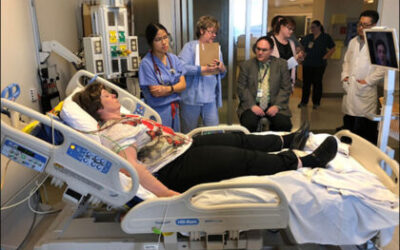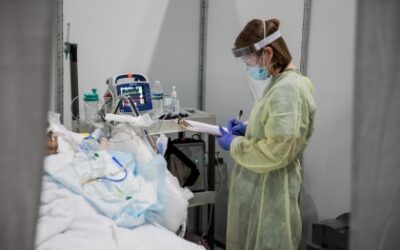Outcomes of out-of-hospital cardiac arrest appears to have worsened, not only nationally but also at the state level, according to a new study focusing on Texas.
VA Pauses Further EHR Expansion Because of Patient Care Issues
The VA has paused any further expansion of its new electronic health record (EHR) in reaction to an early draft of a VA Office of the Inspector General (OIG) report.
Height Might Be a Risk Factor for Several CV Conditions
Height appears to be an unrecognized non-modifiable risk factor for several common conditions in adults, according to a study using data from the VA Million Veteran Program.
Facility Performance Metrics Unavailable With Spokane EHR Rollout
When VA’s new electronic health record (EHR) went live at the Mann-Grandstaff VAMC in October 2020, the system did not have the metrics in place to allow the hospital to measure how the facility was performing, according to a recent study released by the VA Office of the Inspector General.
Economic Burden of PTSD Is ‘Staggering,’ New Treatments Needed
PTSD can have a profound effect on quality of life and emotional well-being. Symptoms such as nightmares, difficulty sleeping or concentrating, as well as thoughts of self-harm can continue or reemerge throughout life.
Increased Risk of Cardiovascular Mortality in U.S. Veterans Linked to Over- and Under-Treatment With Thyroid Hormones
Both over-treatment and under-treatment with synthetic thyroid hormones are associated with an increased risk of cardiovascular mortality in U.S. veterans, according to a new study.
Prescribing of Antipsychotic Medications for Dementia Dropped Overall at
VHA nursing homes are prescribing fewer antipsychotic and anxiolytic (anti-anxiety) medications for dementia patients, but the overall prescribing of other psychotropic and opioid medications increased, according to a new study.
A free people ought not only to be armed, but disciplined
Pam and I are visiting friends at their lake house on the Sam Rayburn Reservoir in Texas. As we were traveling, we were shocked at the slaughter of 19 children and two teachers at an elementary school in Uvalde, TX, on May 24. This hit particularly close to home, as our middle daughter is a second-grade teacher in Maryland.
Arkansas VAMC Illuminates Bladder Cancer Using Blue Light Cystoscopy
Early-stage cancers can be very challenging to see, but finding them before they advance provides the best chance for curative treatment with the fewest complications.
VA Researcher Focuses on How to Prevent Staff Burnout at VA
For the past five years, Kara Zivin, PhD, MS, MA, has been “chasing burnout,” working to understand what causes it, how to measure it and what are the truly impactful measures that a healthcare system can take to combat it.
Comorbidities Affect When Adjuvant Chemotherapy Is Optimal in NSCLC
While veterans with locoregional non-small cell lung cancer (NSCLC) might find adjuvant chemotherapy beneficial, the risks might outweigh the benefit for some of them.
Survival Affected by Lack of Equitable Access to Pre-Operative NSCLC Care
The VHA appears to fall short in providing equitable access to pre-operative care, which is associated with worse short- and long-term outcomes in clinical stage I non-small-cell lung cancer (NSCLC), according to a recent report.
VA Frailty Index Identifies Older NSCLC Patients at High Risk
The VA’s Frailty Index (VA-FI) was created to identify patients at high risk of unfavorable outcomes. A new study sought to determine how it works with older patients with non-small cell lung cancer (NSCLC).
HCM Management Strategies Lower Morbidity, Mortality Among Patients
New treatment guidelines endorsed highly effective hypertrophic cardiomyopathy management strategies, saying those have altered clinical course and substantially lowered mortality and morbidity rates.
Guidelines Call for Multimodal Imaging to Accurately Diagnose HCM
Multimodal imaging is crucial for the diagnosis and care of patients with hypertrophic cardiomyopathy (HCM), according to new guidelines from the American Society of Echocardiography.
Demographics of Hypertrophic Cardiomyopathy Patients Appear to Be Changing
The typical hypertrophic cardiomyopathy patient appears to have changed somewhat, according to a new study, which points out that “clinicians are encountering a phenotype of hypertrophic cardiomyopathy evolving from the disease recognized several years ago.”
VHA National Telestroke Program Uses Technology to Improves Acute Stroke Care
Prompt access to specialized care is critical to limiting the damage caused by a stroke.
VA Adds Nine Rare Cancers to Presumed Service-Connected Disabilities
Nine new rare respiratory cancers are now on the VA’s list of presumed service-connected disabilities for certain veterans exposed to fine particulate matter during military service.
VA Researchers Put Spotlight on COVID-19 Rebound After Paxlovid Therapy
Concerns raised by VA clinicians have played a central role in discussions of rebound cases of COVID-19 after treatment with the antiviral combination marketed as Paxlovid.
Ground-breaking Study in U.S. Military Finds Link Between MS, Epstein-Barr Virus
Researchers with the Uniformed Services University of Health Sciences (USUHS) and the Harvard T.H. Chan School of Public Health appear to have solved one of the most perplexing mysteries in medicine: What causes multiple sclerosis (MS)?
Multiple Myeloma Patients Usually Respond Well to COVID-19 Vaccines
While about one-fourth of blood cancer patients failed to produce detectable antibodies after COVID-19 vaccination, those with multiple myeloma fared better than most.
Genetic 17p Deletion Doesn’t Affect MM Survival by Race
African Americans have an increased incidence of multiple myeloma (MM) but do not appear to be at a disadvantage in terms of overall survival, however.
Hormones Affect Sexual Function After AHSCT
How do hormones affect sexual function recovery after autologous hematopoietic stem cell transplantation (AHSCT), which is the standard of care for younger patients with newly diagnosed multiple myeloma.
COVID-19 Pandemic Hits VHA’s MOVE! Weight-Loss Program Hard
The VHA acted quickly to convert its MOVE! Weight Management Program for Veterans to virtual care using telehealth when the COVID-19 pandemic hit in early 2020.
Drilling Down in Past Studies Can Help Individualize Type 2 Diabetes Treatment
One size doesn’t fit all, even when it comes to deciding which Type 2 diabetes patients would derive cardiovascular benefit from intensive glycemic control.
Glitches, Legislative Objections Don’t Stop VA Electronic Record Rollout
VA recently launched its new electronic healthcare record system in a third region, despite evidence of problems with previous deployments and strong objections from legislators and oversight groups.
Million Veteran Program Helps Link Genes for Severe COVID-19, Other Diseases
From the earliest days of the pandemic, it was evident that people with certain medical conditions faced an increased risk of severe COVID-19.
Health is like money, we never have a true idea of its value until we lose it.
When Pam and I picked up the RV we now live in (hanging out in Tampa, Florida, at the moment), we needed to purchase some ‘must-haves’ for full time motorhome living. While I was perusing the sewer hose aisle (how glamorous my retirement life is), Pam had fallen into a conversation with a fellow female RVer about the insanity we had just committed with the sale of our home, cars, and everything we own to live full time in a 31-foot Winnebago.
Using Chemotherapy After Noninvasive Bladder Cancer
Using one dose of intravesical chemotherapy immediately following surgery for nonmuscle invasive bladder cancer is recommended in national and international guidelines.
Diagnosis of Bladder Cancer Has Dropped During COVID-19 Pandemic
In 2020, compared with baseline years 2018 through 2019, more than 2,000 fewer bladder cancers were diagnosed in the VA’s healthcare system.






